The best touchscreen laptops in 2024 - our top picks
These are the best touchscreen laptops you can buy right now
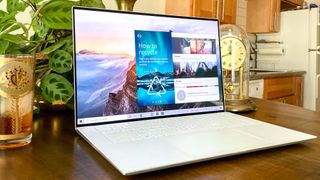
The best touchscreen laptops have responsive, accurate screens that make swiping and tapping your way through work or play feel natural and intuitive. They also have bright, vibrant displays, and are often mounted on a 360-degree hinge that lets them flip over to use as tablets.
In addition to all of the above, touchscreen laptops have improved by leaps and bounds in recent years as PC operating systems have been refined for touch input. While you won't find any Macs with touchscreens (though we hear MacBooks with touchscreens may debut as soon as 2025), Windows 11 and ChromeOS are both very usable with nothing but your fingers.
Now that displays have gotten better, laptops have gotten smaller and components have become more powerful, there are a ton of options available to you when you're in the market for a new portable PC with a touchscreen—and many of them rank among the best laptops you can buy.
These are the best touchscreen laptops we recommend, based on our own hands-on testing and reviews.
The best touchscreen laptops you can buy today
Why you can trust Tom's Guide
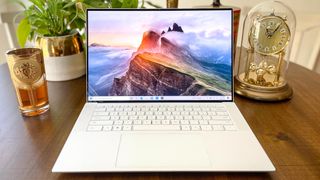
Specifications
Reasons to buy
Reasons to avoid
The Dell XPS 15 is our top recommendation for the best touchscreen laptop because it's fast, portable and has a great touchscreen that seems to float in the air thanks to Dell's ultra-thin bezels.
Plus, you can pay an extra $400 or so to upgrade the XPS 15 with a 3.5K OLED touchscreen that makes colors and contrasts look far more striking than they would on a standard laptop display. And while the smudges from tapping and swiping on it can be a little distracting, a decent screen cleaning cloth is all you need to deal with that headache.
The XPS 15 is a great laptop even if you don't care about the touchscreen, since you can configure it with powerful Intel CPUs and Nvidia GeForce RTX 40-series laptop GPUs. Kit it out with the most expensive components and it can even double as a decent gaming laptop, though it can't match the best of the best and its sub-10 hour battery life (or sub-2 hour when gaming) is a little disappointing.
Read our full Dell XPS 15 (2023) review.
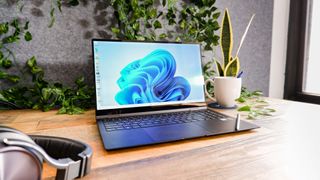
Specifications
Reasons to buy
Reasons to avoid
The Samsung Galaxy Book2 Pro 360 is an ultra-thin 2-in-1 laptop sporting a gorgeous AMOLED display, a speedy CPU under the hood and decent battery life.
While it does also sport a middling webcam and Samsung apps that are basically bloatware if you're not invested in the Galaxy ecosystem, this remains a 2-in-1 we highly recommend to those who are in the market for a speedy convertible that plays well with Samsung devices.
We recommend this older model over the newer Galaxy Book3 Pro 360 because the newer version lasted four hours less in our battery test, without offering a lot of gains in other areas to offset that loss. But both are great, and the fact they come with an S Pen stylus included is a great value.
Read our full Samsung Galaxy Book2 Pro 360 review.
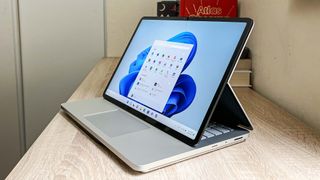
Specifications
Reasons to buy
Reasons to avoid
Microsoft's Surface Laptop Studio 2 is a powerful 2-in-1 with a MacBook Pro-like design and an eye-catching hinged display. This is Microsoft’s flagship device for Windows 11, which promises to make Windows a more inviting place for both work and play.
And for the most part, it is all that: its 13th Gen Intel CPU and 16+ GB of RAM gives you enough power to tackle most work, and if you splurge for a model with the discrete Nvidia GeForce RTX 4050 or 4060 GPU the Surface Laptop Studio also doubles as a decent machine for gaming or video editing on the go. We've also heard it's an ideal choice for college engineering programs which require laptops that both have a discrete GPU and can be used with an active stylus. While you have to pay extra for the Microsoft Surface Slim Pen 2 stylus, its haptics make writing or drawing on the Studio's 14.4-inch 120Hz touchscreen feel great.
However, it's a bit pricey when you kit it out, and despite its great components the Surface Laptop Studio delivers subpar performance compared to the best MacBooks and Windows laptops. But its intriguing sliding display is like nothing else on the market, and it's worth reading our full review to see it in action.
Read our full Microsoft Surface Laptop Studio 2 review.
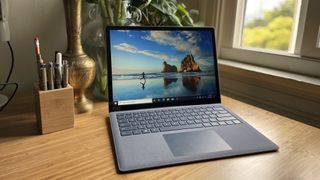
Specifications
Reasons to buy
Reasons to avoid
If you're looking for a premium Windows touchscreen laptop to get work done from anywhere, the Microsoft Surface Laptop 4 is the way to go. It has a nice responsive touchscreen and a comfy keyboard with well-sized, satisfying keys. Plus, it packs competent components into a thin, light chassis, and it comes with a clean bloatware-free Windows 10 install.
Add in its respectable 10-plus hour battery life and the touchscreen's tall 3:2 display ratio, which can help you read and edit documents more comfortably, and you have a great notebook for getting things done on the go. The speakers are pretty good, too; in fact, this is one of the best-sounding laptops around.
Read our full Microsoft Surface Laptop 4 review.
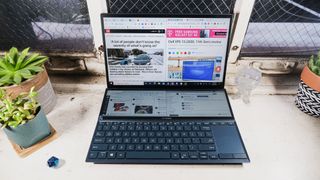
Specifications
Reasons to buy
Reasons to avoid
The Asus ZenBook Duo 14 is great for anyone who needs two touchscreens on their laptop, because Asus has embedded a 12-inch touchscreen above the keyboard. It might seem like a gimmick, but in our hands-on testing we found it's actually a great home for secondary applications like as Spotify, Slack, Discord and more. It can also be used by creative apps from the likes of Adobe, who put touch controls there.
On top of that, its performance is speedy and competitive with the XPS 13, which it trades rounds with in head-to-head comparison. Plus, its battery life is long — especially when you realize it's got two screens to light up.
The big downside, though, is that there's almost no room on the keyboard deck for you to rest your wrists, making the ZenBook Duo 14 a bit ergonomically unfriendly. But if you invest in an external wrist rest, you should be good.
Read our full Asus ZenBook Duo 14 review.
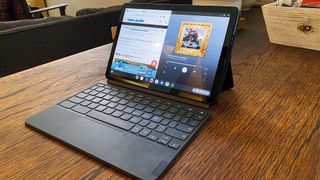
Specifications
Reasons to buy
Reasons to avoid
We love the Lenovo Chromebook Duet because it's a surprisingly competent Chrome tablet given its remarkably affordable $279 price tag, and it comes with a free detachable keyboard that you can use to turn it into a totally serviceable Chromebook.
The touchscreen is accurate and responsive no matter how you use it, and it looks nice and sharp to boot. Plus, it's got great battery life, lasting nearly 13 hours in our in-house battery tests.
Read our full Lenovo Chromebook Duet review.
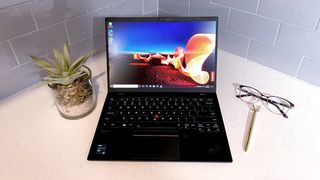
Specifications
Reasons to buy
Reasons to avoid
The Lenovo ThinkPad X1 Nano is one of the best touchscreen laptops when weight is key, because it manages to pack highly performant components into a slim, 2-pound chassis. The touchscreen feels comfortable to use, as does the snappy keyboard, and its 12-hour battery life (based on our in-house battery testing) helps you carry it all day without worrying about bringing a charger.
You can get the ThinkPad X1 Nano for around $1,500 too, which is a pretty good price for what you get. You just might need to pack a USB-C hub, though, as the X1 Nano's a little light on ports.
Read our full Lenovo ThinkPad X1 Nano review.

Specifications
Reasons to buy
Reasons to avoid
The Dell XPS 15 offers all the virtues of the XPS 13, but with a larger touchscreen that feels responsive to the touch and makes navigating Windows via touch feel fluid and natural. If you splurge for the 3.5K OLED display option, you'll enjoy touching and tapping your way across one of the prettiest laptop screens in the business.
Don’t let its slim and stylish design fool you, either — the Dell XPS 15 is an absolute workhorse. Its cutting-edge Intel CPUs can juggle tasks with ease, and the optional GeForce RTX discrete GPU upgrades give you a bit of muscle to play games. Factor in a pair of impressively loud speakers and solid battery life for a 4K laptop, and the new XPS 15 is one of the best 15-inch laptops you can buy.
Read our full Dell XPS 15 OLED review.
Not interested in OLED? Don't miss our Dell XPS 15 (2020) review.
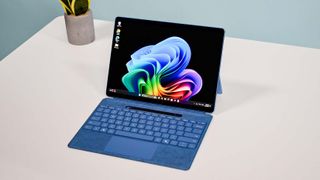
Specifications
Reasons to buy
Reasons to avoid
The Microsoft Surface Pro 11 is the best Surface Pro in years, for two reasons: Snapdragon and OLED.
While the base model comes with a perfectly functional 13-inch LCD touchscreen, you can add a little luxury to this Windows 11 tablet by splurging on the OLED touchscreen upgrade. It adds a new level of quality to the tablet's display, and makes everything you watch or do on it look a little nicer.
Add in the new Snapdragon X Plus or Elite chips you can get inside and this tablet becomes the most interesting Surface Pro we've seen in a long time. The Snapdragon chips affords the tablet speedy performance and good battery life (12 hours in our testing), which is great to have in a Windows 11 machine this portable.
So if you're in the market for a Windows tablet that can double as a laptop (if you pay for the attachable keyboard, which is a bit too expensive for my liking), you'll be well-served by the Surface Pro 11.
Read our full Microsoft Surface Pro 11 review.
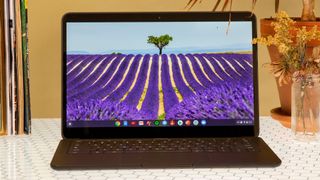
Specifications
Reasons to buy
Reasons to avoid
The highly portable Google Pixelbook Go is a touchscreen Chromebook with a slim, lightweight design that weighs just over 2 pounds and a rubberized, easy-to-grip chassis that comes in sleek Just Black and Not Pink paint jobs. The quiet, comfortable keyboard is pretty nice, too.
The Pixelbook Go is a great touchscreen laptop for students who need a Chromebook because it offers long battery life (11+ hours), solid performance, a bright, colorful display and a responsive touchscreen. If you've got over $600 to spend, this is one of the best Chromebooks yet for those willing to dip into the premium range. Just be aware that the Pixelbook Go is a bit short on ports, and doesn't fold into tablet mode like its bigger Pixelbook brother does.
Read our full Google Pixelbook Go review.
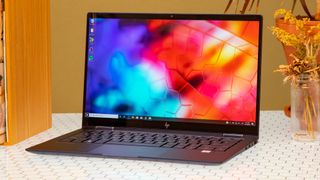
Specifications
Reasons to buy
Reasons to avoid
The HP Elite Dragonfly is a touchscreen 2-in-1 with one of the most stunning designs we've ever seen on a laptop, sporting incredibly thin edges that measure just 0.6 inches in thickness and a deep blue coat of paint that looks refreshing, mesmerizing and professional all at once. And while the Dragonfly is wonderfully light at 2.5 pounds, it also feels impressively sturdy, has an oleophobic coating to prevent fingerprints and uses recycled ocean-bound plastics to help the environment.
Performance and features-wise, this beauty is a beast. Its stunning 13.3-inch touchscreen crushed our color and brightness tests, and it helps make TV and movies look great. Its Intel CPUs are beefy enough to handle business-grade workloads without issues, and its keyboard is one of the most pleasant we've ever typed on. HP Elite Dragonfly also offers over 12 hours of battery life, so you can carry it through a day of meetings without needing to worry about running dry. The Dragonfly is on the expensive side with a starting price of $1,629, but those who are willing to pay a premium will be rewarded with one of the best touchscreen laptops on the market.
Read our full HP Elite Dragonfly review.
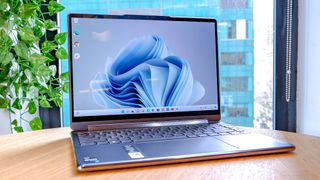
Specifications
Reasons to buy
Reasons to avoid
The Yoga 9i Gen 7 is a marked improvement over last year's iteration in many ways. That's saying a lot considering how much we liked that 2-in-1 laptop, but this update is simply that good. The beefy 12th Gen Intel Core i7 processor and bountiful RAM allow for seamless multi-tasking, while the spacious keyboard lets you work comfortably for hours.
The improved webcam and roaring speakers are also highlights. While the battery life on our configuration is less than the previous model, you should be able to get through most of an average workday.
The only major complaint we have with this laptop is that it makes for a somewhat awkward tablet. Yes, the touchscreen is snappy and easy to use, but the laptop's size means you can't comfortably hold it in one hand as you would with smaller tablets. But it's entirely possible some folks will consider the Yoga 9i as a perfectly capable Windows tablet despite its size.
Minor qualms aside, this is one of the best 2-in-1 laptops we've tested and is one worth considering.
Read our full Lenovo Yoga 9i Gen 7 review.
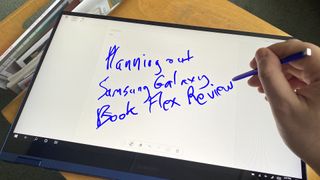
Specifications
Reasons to buy
Reasons to avoid
From its bright 15-inch touchscreen to its strong performance and even more striking color, the Galaxy Book Flex is a great 2-in-1 touchscreen laptop, and its nifty Qi-charging touchpad offers the kind of unique functionality we’d like to see other laptop makers attempt.
We also love the Galaxy Book Flex's fantastic endurance and solid performance, but there are some asterisks getting in the way. Specifically, its keyboard takes some getting used to, thanks to a questionably-placed fingerprint reader and shallow keys. Still, if you need a great touchscreen 2-in-1 with the longest battery life on the market (the Flex lasted an amazing 15 hours and 44 minutes in our battery test) this is the laptop for you.
Read our full Samsung Galaxy Book Flex review.
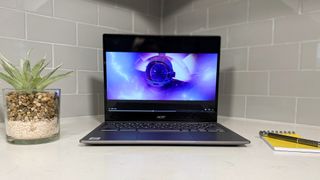
Specifications
Reasons to buy
Reasons to avoid
Acer serves up the trifecta of fast, long-lasting and affordable with the Chromebook Spin 713. This sleek silver touchscreen laptop weighs just 3 pounds, and it offers incredible performance for a Chromebook thanks to its Intel Core i5 CPU. Plus, it has a surprisingly bright and colorful display.
We'd rank it higher were its speakers a bit stronger, or its keyboard a little larger. Still, the Chromebook Spin 713 is more than deserving of a spot on this list of the best laptops around. It delivers great value for its $629 asking price — and it often gets put on sale at lower prices.
Read our full Acer Chromebook Spin 713 review.
How we test the best touchscreen laptops
To find the best touchscreen laptop, we run every machine we review through a rigorous suite of benchmarks and real-world tests to gauge how it will perform during everyday use.
When they arrive at our lab we measure the average brightness and color quality of each laptop's display using our in-house light meter and colorimeter. To test performance we run these machines through a gauntlet of tests, including Geekbench 6 (CPU performance), as well as various 3DMark tests to measure graphics capabilities. We also run a file transfer test to measure how fast a machine's hard drive is, and a custom battery test that has the machine browse the internet over Wi-Fi until it runs out of juice.
After we've run our suite of lab tests the laptop is delivered to one of our crack reviewers for hands-on testing. This involves at least a week of daily use, during which the reviewer tests how well the laptop stands up to everything from working remotely to watching movies, playing games, listening to music, and creating content. Each reviewer also tests how effective and comfortable the laptop is during daily use, evaluating the design and accuracy of the keyboard, touchpad, and touchscreen.
Sign up to get the BEST of Tom's Guide direct to your inbox.
Get instant access to breaking news, the hottest reviews, great deals and helpful tips.

Alex Wawro is a lifelong tech and games enthusiast with more than a decade of experience covering both for outlets like Game Developer, Black Hat, and PC World magazine. A lifelong PC builder, he currently serves as a senior editor at Tom's Guide covering all things computing, from laptops and desktops to keyboards and mice.